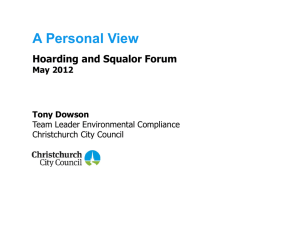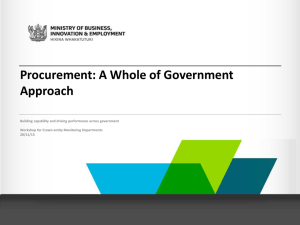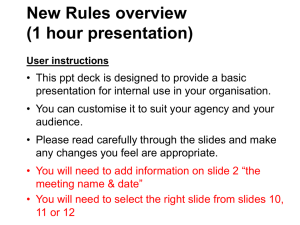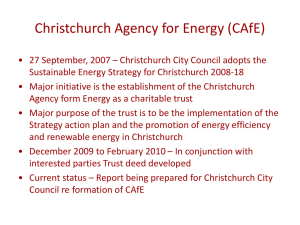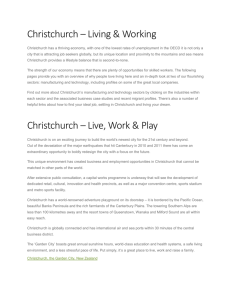Christchurch Integrated Government Accommodation Project Market
advertisement
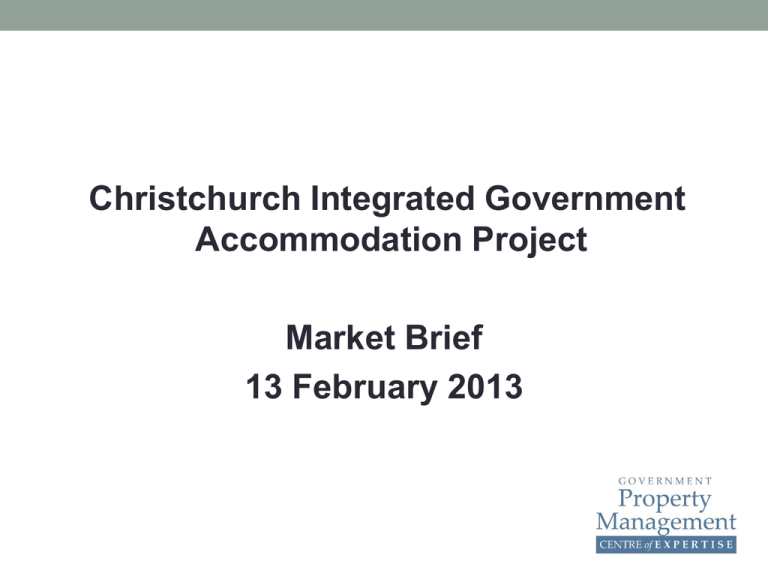
Christchurch Integrated Government Accommodation Project Market Brief 13 February 2013 Agenda • Purpose of the Briefing • Background • Objectives of the project • Business Case and Procurement Process • Wellington example • Timelines • Approval process • Government requirements • Building Performance Specifications (outline) • Key design elements • Overarching government themes • Summary Purpose of the Briefing • To highlight what the Crown’s requirements are; • The procurement and business case process that will be applied for the CIGA project; • Indicative timelines; and • Questions and answer session so all parties are better informed in relation to providing office accommodation for government agencies based in Christchurch. Background • Government has the Christchurch rebuild as one of its top four priorities for this term in office • Government has committed to returning to the central city to support the rebuild of the CBD • Chief Executive of the Ministry of Social Development (MSD) given Functional Leadership (Property) mandate for Christchurch “agreed that the Chief Executive Ministry of Social Development sign off on all departmental property decisions in Christchurch. This is to cover both decisions in relation to the Christchurch CBD (office accommodation for regional management and corporate support functions) and the wider service delivery network” Background (continued) • Role of PMCoE • Established in April 2011 to drive efficiency and effectiveness gains in property management across Departments and Crown Agents. • In October 2012 given greater mandate by Cabinet, to include: • mandatory property principles, standards and guidelines • mandatory all-of-government procurement for property related goods and services • sign-off by the functional leader on tenure decisions • sign-off by the functional leader on biennial property plans, and • compulsory adoption of a common information system. • CIGA project represents a tranche of this mandate Background (continued) • Interim short-term solutions occupied by government agencies after the earthquakes. • Most are not desirable for long-term occupation • Multiple sites = inefficiency and ineffectiveness • Lease expiries vary between 2013-2019 • Need to align to long-term solution CIGA Project Objectives • The Objectives for the CIGA Project are: • To provide an enduring office accommodation solution for the participating agencies in Christchurch • To optimise the use of office space leased by participating agencies in Christchurch • To minimise the whole-of-life cost per work point for office accommodation leased by participating agencies in Christchurch • To improve the flexibility and responsiveness of the Crown’s property portfolio • Utilise the property solution to better enable agency, sector and All-of-Government business outputs • To provide and maintain safe standards of buildings for government employees in Christchurch • To promote the economic recovery and rebuild of the Christchurch CBD Procurement and Business Case Process • PMCoE led, agency supported single procurement and business case process • Procurement • Request for Information (RFI) used to inform process (Nov/Dec) • Single stage Request for Proposal (RFP) • Trial closure for initial assessment; allow subsequent • • • • modifications/ enhancements to proposals before final closure and assessment Short-list of suppliers from RFP to develop collective options Cost-benefit analysis of collective options Negotiations with preferred suppliers will commence once Cabinet approval given from business case Short-list will provide redundancy if negotiations are unsuccessful with a preferred supplier • Business Case • Follows Treasury’s Better Business Case process • Procurement process integrates into business case Wellington Example • Joint procurement and business case process for MSD, MoH, MBIE, MoE and Crown Law Office. • Status Quo: 124,447m2, Preferred solution: 87,522m2 (30%) • Significant cost avoidance for participating agencies; some projected to realise baseline savings over 20 years • Improved building safety and business continuity capability • Functional Leadership ICT and Procurement integration • Greater commonality and flexibility Indicative Timelines Work Stream Deliverable Timeline (a) (b) (c) Procurement Procurement Plan 12 Nov 2012 Procurement Request for Information 20 November – 11 December 2012 Procurement Market Brief 13 February 2013 Procurement Request for Proposal (incl trial closure) March - May 2013 Procurement Short-list of suppliers June 2013 Business Case Selection of preferred solution July 2013 Business Case Internal approval of Cabinet paper and business case July 2013 Business Case External review and approval by Cabinet August 2013 Procurement Negotiations with preferred suppliers for Development Agreements and draft Deeds of Lease September – December 2013 Approvals Process • Internal authorisation of the preferred suppliers made by Steering Group (Deputy Chief Executive level group from agencies), chaired by the project Senior Responsible Owner (Marc Warner, MSD) • External authorisation from central agencies (primarily Treasury) and officials group • State Sector Reform and Expenditure Control Committee (SEC) approve the business case and seek Cabinet endorsement • Once negotiations are complete with preferred suppliers, the Development Agreement can be signed after joint Ministers approve final financial authority for the terms agreed Government Requirements • Enduring office accommodation for 18 agencies • May also require short-term decant space to support • • • • • • long-term solution 25,000m2 of enduring office space, made up of multiple proposals Govt expectations of 12-16m2 per workpoint (planning 13m2) Located within the Christchurch CBD Can be new build, refurbishments or existing space Will consider mixed-use developments (e.g. retail/office) Does not include other government-related projects such as MSD/IR call centre / Justice and Emergency Services Precinct etc. Building Performance Specifications Overview The BPS was designed to optimise whole of life efficiency and effectiveness, maintaining the best value for money throughout the life of the lease. The BPS focuses on performance, as opposed to actual system and product type. Some key points: Structural Legislation and building code applies to standards. Specification focuses on straight, true and level structures (walls, floors etc) Interior Design Specification of finishes being modest and fit for purpose. Lighting and acoustic treatments being ‘modern but standard’ Mechanical Heating and cooling performance based on a standard 21-22oC environment. Preference for energy recovery and heat exchange plant incorporated. Flexible on system and plant product types Electrical Full BMS with tenant access for monitoring and reporting. Tenant provided access control system to include perimeter where Crown is sole tenant. Access to use roof for plant and communications equipment Energy High performance double glazing, fully insulated shell preferred. Building energy use less than 120kWh/sqm/p.a. Encourage energy efficient lighting solutions, such as harvesting and LED (building energy use modelling). NABERS-NZ rating (preferably 3+ of completed solution) Key Design Elements • Preference for large floor plates • Good vertical and horizontal connectivity (site lines • • • • and access) Efficient floor plates (minimise unusable space e.g. core & columns) Floor plates should have higher ratio of natural light for work areas to darker core space for enclosed rooms Perimeter cabling vs dropper cables Prefer higher NBS rating Overarching Government Themes • Modesty in aesthetics • Larger and more efficient floor plates • Good value for money • Cost effective building services • Flexibility in lease terms • Focus on long-term occupation • Opportunity to integrate fit-out • Collaborative environment encouraging staff interaction Summary • Government is committed to returning to the CBD • We want a timely process to successfully complete negotiations with preferred suppliers • Working closely with CERA to achieve the best outcome for both the Crown and the market • Welcome feedback and comment Questions? External website: www.pmcoe.govt.nz Point of contact: Paul McKeefry paul.mckeefry@pmcoe.govt.nz


